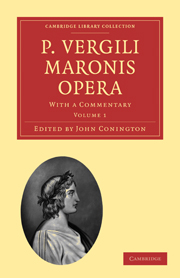ON THE LATER DIDACTIC POETS OF ROME
Published online by Cambridge University Press: 07 September 2010
Summary
Having spoken of the Latin Pastoral writers who came after Virgil, I may naturally be expected to say something of his successors in Didactic Poetry. It is true that the two cases are not precisely parallel: in the one not only the kind of poetry, but the subject, was the same as Virgil's own: in the other the similarity merely affects the form, and does not extend to the matter. Like Virgil, Calpurnius and Nemesianus sang of the contests, the loves, the laments of shepherds: unlike Virgil, Manilius, Gratius, Nemesianus, and Serenus Sammonicus, sing of astronomy and astrology, of the chase, and of the cure of diseases. Here, however, as in the Introductory Essay to the Georgics, I am addressing those who, like myself, are students of Roman poetry, not students of Roman agriculture, so that I shall need no apology for devoting a short time to the examination of writers whose works resemble the Georgics as the Georgics themselves resemble not the treatises of Cato and Varro, but the poems of Lucretius. These writers of course will be themselves considered simply with reference to their form: to discuss their matter is a task which is fortunately beyond my purpose, as it is certainly beyond my ability.
The most considerable Latin Didactic poem subsequent to the Georgics is unquestionably the Astronomical of Manilius. It is divided into five books, consisting respectively of 926, 970, 682, 935, and 745 lines, so that its length is nearly double that of Virgil's work. Its date is still an unsolved problem.
- Type
- Chapter
- Information
- P. Vergili Maronis OperaWith a Commentary, pp. 365 - 378Publisher: Cambridge University PressPrint publication year: 2010



